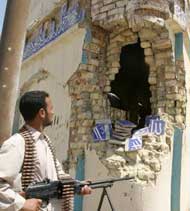|
Najaf Shrine Handover Talks Underway
 |
|
Fighters of Mehdi Army stand guard near Imam Ali shrine
|
AN-NAJAF,
August 21 (IslamOnline.net & News Agencies) - Moqtada Al-Sadr's
Mehdi Army was still in control of Imam Ali shrine in the flashpoint
city of Najaf as it remained unclear when or if the Shiite fighters
would relinquish control to top Shiite leader Grand Ayatollah Ali
Al-Sistani following 17 days of pitched battles with the US-led Iraqi
forces.
Supporters
of the fiery leader remained camped out in the mausoleum, one of
Shiites’ holiest shrines, Saturday, August 21, as armed fighters
prowled the streets of the Old City, reported Agence France-Presse
(AFP).
“The
keys have not yet been delivered to Sistani's office, which has set
conditions for accepting them,” Sadr aide Ali Smeisim told AFP,
after a spokesman for the ayatollah earlier said they had already been
handed over.
Smeisim
said Sistani's office was insisting that the compound be evacuated,
all its doors locked and the keys delivered in a stamped envelope.
“A
delegation from the ayatollah's office will come and draw up an
inventory of all the items of value in the mausoleum to ensure that
nothing has been damaged before the keys are returned,” he added.
Smeisim
said the militia had been given the keys by a representative of the
Shiite religious leadership five months ago, raising questions about
the relationship between them which had been understood to be
strained.
In
a letter circulated in Najaf late Thursday, August 19, and signed by
the firebrand Shiite leader, Sadr urged his followers to hand over the
shrine to the Shiite leadership (Al-Marjiyah or hawaza in Arabic).
The
move also came a few hours after interim Prime Minister Iyad Allawi
made a "final
call" for Sadr to disarm his militia, withdraw from
Imam Ali Shrine or face a massive onslaught.
Situation
on the Ground
As
tensions eased in Najaf, life also began to return to normal in the
Baghdad Shiite stronghold of Sadr City, where residents awoke to a
much reduced US military presence after days of heavy fighting.
Stores
reopened and residents again dared to venture outdoors.
On
the ground, one person was killed and 12 wounded, including three
children, in Najaf's twin city of Kufa during overnight clashes
between US forces and the Mehdi Army, medics said.
Shiite
fighters charged that US troops had attempted to storm the Maitham
Al-Tamar mosque, resulting in three hours of clashes.
An
AFP correspondent saw a huge hole in the outer wall of the mosque
compound. Part of a court building opposite was blackened and gutted
by fire, with blood smeared on the windows.
 |
|
Maitham Al-Tamar mosque,
shelled by US fire
|
Further
north, in the troubled city of Baquba, a roadside bomb exploded at
around 8:30 am (0430 GMT), killing a peddler and wounding five
dustmen, police and medics said.
Another
Baquba dustman was killed and another wounded when they opened what
looked like a US soldier's food package. A bomb inside, disguised as a
bottle, exploded in their hands at around 9:00 am (0500 GMT), said a
medic.
Up
in Mosul, one national guardsman was killed when a roadside bomb
exploded in the path of his convoy in the Al-Baladiat district of the
main northern city, said Captain Aws Mohammad Adel.
A
hospital doctor said three civilians and two national guardsmen were
also wounded in the attack.
In
Tall Afar, west of Mosul, the nephew of the director of a state
electricity company was killed, when gunmen opened fire outside the
home of his uncle, Beshir Mohammed, deputy Mosul governor Hazem Kalawi
said.
A
medic at the local hospital said Mohammed and his son were wounded but
in a stable condition.
Foreign
Troops Killed
In
southern Baghdad, a US soldier was killed and two others wounded, when
a rocket-propelled grenade slammed into their vehicle, the military
said.
A
Polish soldier was also killed and six others wounded in a car bombing
near Hilla, south of the capital.
US
ally Poland heads a multinational force of 6,500 administering a
swathe of Iraq south of Baghdad. Poland hopes to reduce the number of
troops it has in the country from 2,500 to 1,500 soldiers in early
2005.
In
the restive western city of Ramadi, a senior Iraqi policeman was shot
dead early Saturday.
Colonel
Saad Samir Al-Dulaimi, head of the crime fighting unit in Ramadi, was
gunned down as he left home at around 8:30 am (0430 GMT), said police
Captain Ghassan Kadhim.
Meanwhile,
the Nepalese government said it was checking reports on 12 of its
citizens reportedly abducted in Iraq.
A
website posted a statement from a militant group Friday, August 20,
saying that fighters had taken captive 12 people who were
“affiliated with a Nepalese company”.
|